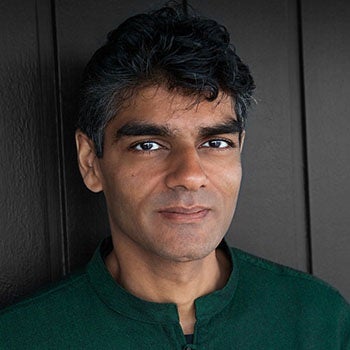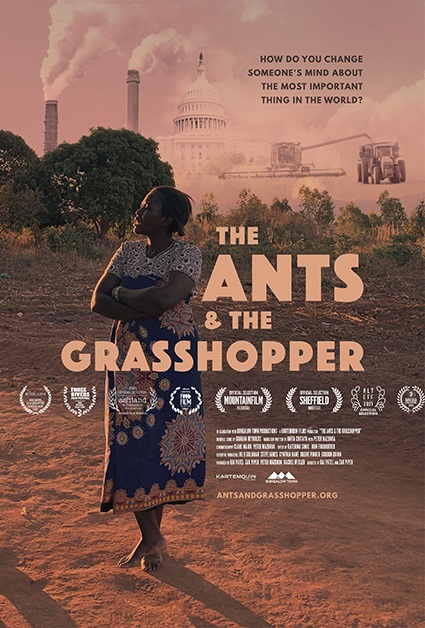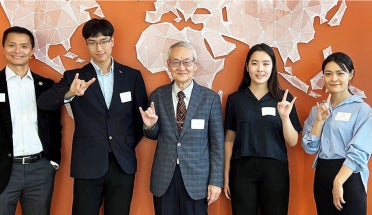
LBJ School Screens Award-Winning Climate Change Documentary
- Jan 24, 2023
- Global Engagement and Strategy
- by Ellen Stader
The LBJ School of Public Affairs filled the Bass Lecture Hall with more than 100 attendees for a January 2023 screening of “The Ants & the Grasshopper,” a documentary co-directed by LBJ Research Professor Raj Patel that tells the story of Anita Chitaya, a Malawian farmer and activist trying to save her home and crops from extreme weather caused by climate change.
The documentary explores the complex interweaving of agriculture, politics, colonialism, patriarchy, racism, resource inequity, climate change and other factors that affect how food is grown and shared around the world.

Patel answered questions from the audience and addressed food insecurity in the United States and Texas.
“The reason people go hungry in America is not that there’s a shortage of food,” Patel said. “You can see plenty of food on supermarket shelves, but you can see people who are homeless and hungry outside. And they are advertising for you the reason that there’s hunger in the world. It's not because of an absence of food; it’s because of poverty.”
Patel studies the world food system and its potential alternatives, regularly contributing to newspapers, podcasts, broadcast media and scholarly journals. As a member of the International Panel of Experts on Sustainable Food Systems, he has testified about hunger and food sovereignty to governments in the United States, United Kingdom and European Union.
Focusing on Food Production and Equity
Patel connected with Chitaya years earlier, witnessing a transformation she led in her village of Bwabwa. She wielded not only new agricultural methods but also an infectious, optimistic insistence on gender equity, seeking to even out the distribution of labor between men and women in the interest of benefiting the entire village. Her efforts ultimately yielded successful results, which are chronicled warmly in the film. “I do reach people,” Chitaya said with a quiet smile.
Chitaya was working with her mentor, former nurse Esther Lupafya, and local organization Soils, Food and Healthy Communities (SFHC), which “promotes agroecological farming practices to help communities increase soil fertility, sustain nutritious and diverse diets, encourage democratic leadership and gender equity, and build resilience against climate change.” Together they introduced self-sufficient farming and cooking methods to improve crop yields, soil health and sustainability, and quality of life in Bwabwa.
Describing his early connections there, Patel said, “Here was a place that was on its way to ending patriarchy and, at the same time, had figured out ways of feeding the community despite some fairly difficult macroeconomic circumstances. So, the story of Malawi kind of recommended itself.”
Climate Change Enters the Picture
Patel and co-director Zak Piper conceived the documentary during an enlightening 11-year partnership with Chitaya, working toward food sustainability in her community. Once shooting was underway, however, a worsening drought began to further threaten farmers in Malawi and the greater region. The acute lack of food and water changed Chitaya’s focus — and that of the film, as well.
“We never went in thinking about climate change,” Patel said. “The climate change element emerged from a workshop that Anita had attended. ... Halfway through filming, she came to us and said, ‘I just learned about climate change. Do you need me to come to America and talk to these people?’ ”
Bringing the Message to the United States

The documentary follows Chitaya and Lupafya on their journey through the United States to convince Americans that climate change is real —and important. “We’re going find out why Americans aren’t taking climate change seriously,” said Chitaya early in the trip that would take them through the Midwest, San Franciso, Oakland, Detroit and finally Washington, D.C.
Visiting farms and urban food cooperatives around the country, the women soon became acquainted with national divisions around the issue, spotting and calling out the influences of patriarchy, racism and economic pressures of capitalism whenever they appeared. They encountered equal support and skepticism for their message: that America’s agricultural and commercial practices do, in fact, impact how and whether families can feed themselves across the globe.
“This is about transforming the way that we organize,” concluded Patel during the Q&A. “It’s about ending patriarchy. It’s about ending racism. All of that is difficult. ... There are difficult conversations [to be had] about what we owe the rest of the planet, living the way that we do.”
“The Ants and the Grasshopper” screened at the COP26 Climate Summit in Glasgow and received awards and recognitions in 2021 and 2022 from the University Co-operative Society, MountainFilm Festival, Aldo Leopold Foundation, American Conservation Film Festival, Wild and Scenic Film Festival, Greenmotions Film Festival, Middlebury New Filmmakers Festival and Cinem'ambiente Torino.
The documentary screening was made possible by the LBJ School of Public Affairs, Hot Science – Cool Talks at the Environmental Science Institute and Texas Global, whose Internationalization Event Fund provides grants to support high-impact, globally oriented events that involve multiple colleges and schools to reach broad, diverse audiences.
Read more about this documentary and its co-director Raj Patel in an article in Texas Connect.



